Comprehensive Academic Skills Portfolio: ACSK4001 Summer 18 Edition
VerifiedAdded on 2023/06/10
|17
|4575
|84
Portfolio
AI Summary
This Academic Skills Portfolio from Summer 2018 (ACSK4001) includes several tasks designed to assess and develop key academic skills. Section A contains portfolio evidence, including evaluating sources critically, presenting and analyzing data, and presentation skills. The source evaluation task involves analyzing the authority, currency, content relevance, and accuracy of three different academic texts related to Brexit and globalization. The data analysis task requires presenting and interpreting a graph, focusing on trends, comparisons, and possible explanations, followed by an optional rewritten and improved paragraph. The presentation component involves planning and reflecting on a presentation based on a key point from a report/essay. Section B includes writing tasks, consisting of a report or essay and a reflective summary, focusing on critical thought, self-analysis, and the use of appropriate technologies. The portfolio aims to demonstrate an understanding of academic literacy, critical thinking, and self-reflection.
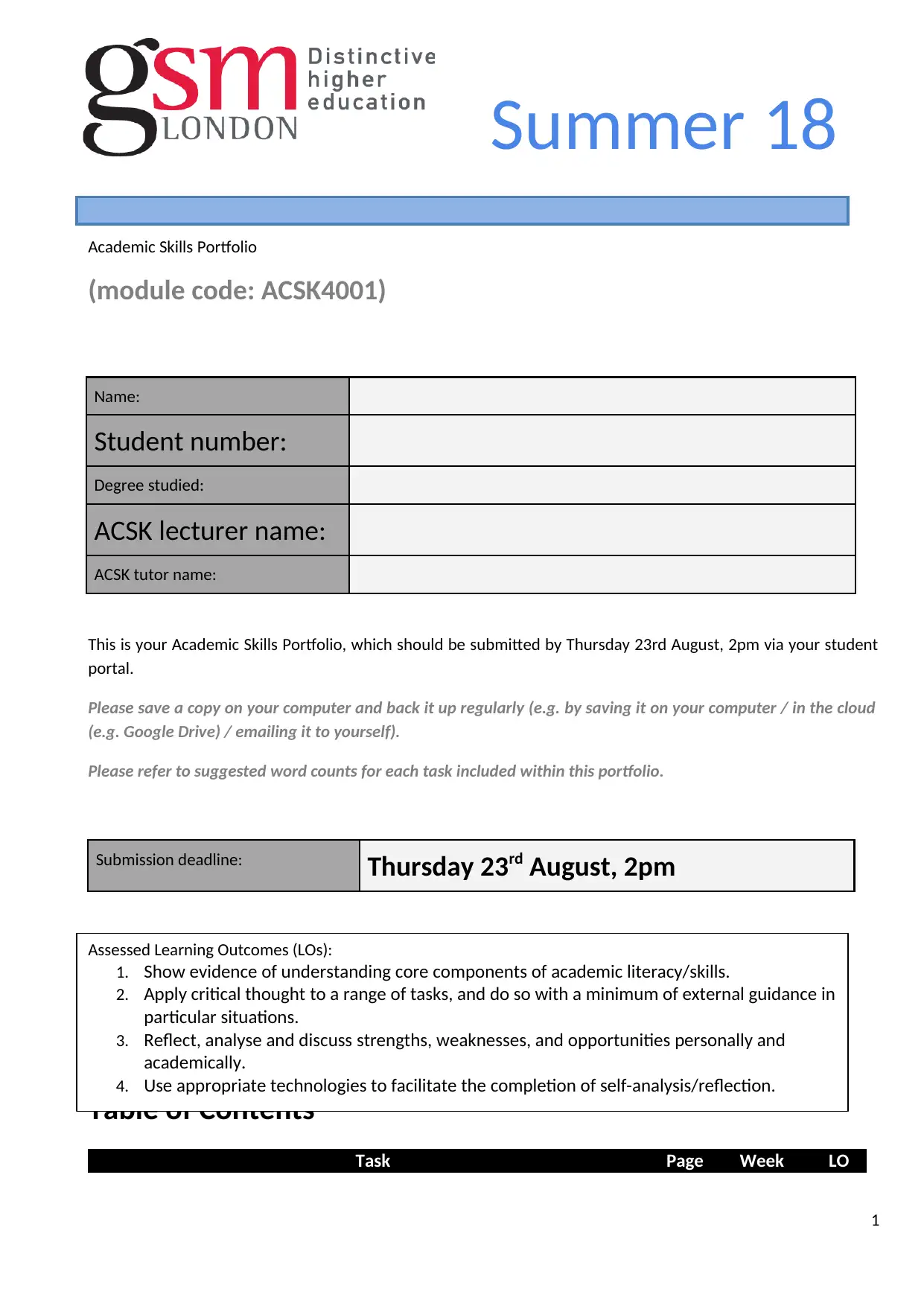
Summer 18
Academic Skills Portfolio
(module code: ACSK4001)
Name:
Student number:
Degree studied:
ACSK lecturer name:
ACSK tutor name:
This is your Academic Skills Portfolio, which should be submitted by Thursday 23rd August, 2pm via your student
portal.
Please save a copy on your computer and back it up regularly (e.g. by saving it on your computer / in the cloud
(e.g. Google Drive) / emailing it to yourself).
Please refer to suggested word counts for each task included within this portfolio.
Submission deadline: Thursday 23rd August, 2pm
Table of Contents
Task Page Week LO
1
Assessed Learning Outcomes (LOs):
1. Show evidence of understanding core components of academic literacy/skills.
2. Apply critical thought to a range of tasks, and do so with a minimum of external guidance in
particular situations.
3. Reflect, analyse and discuss strengths, weaknesses, and opportunities personally and
academically.
4. Use appropriate technologies to facilitate the completion of self-analysis/reflection.
Academic Skills Portfolio
(module code: ACSK4001)
Name:
Student number:
Degree studied:
ACSK lecturer name:
ACSK tutor name:
This is your Academic Skills Portfolio, which should be submitted by Thursday 23rd August, 2pm via your student
portal.
Please save a copy on your computer and back it up regularly (e.g. by saving it on your computer / in the cloud
(e.g. Google Drive) / emailing it to yourself).
Please refer to suggested word counts for each task included within this portfolio.
Submission deadline: Thursday 23rd August, 2pm
Table of Contents
Task Page Week LO
1
Assessed Learning Outcomes (LOs):
1. Show evidence of understanding core components of academic literacy/skills.
2. Apply critical thought to a range of tasks, and do so with a minimum of external guidance in
particular situations.
3. Reflect, analyse and discuss strengths, weaknesses, and opportunities personally and
academically.
4. Use appropriate technologies to facilitate the completion of self-analysis/reflection.
Paraphrase This Document
Need a fresh take? Get an instant paraphrase of this document with our AI Paraphraser
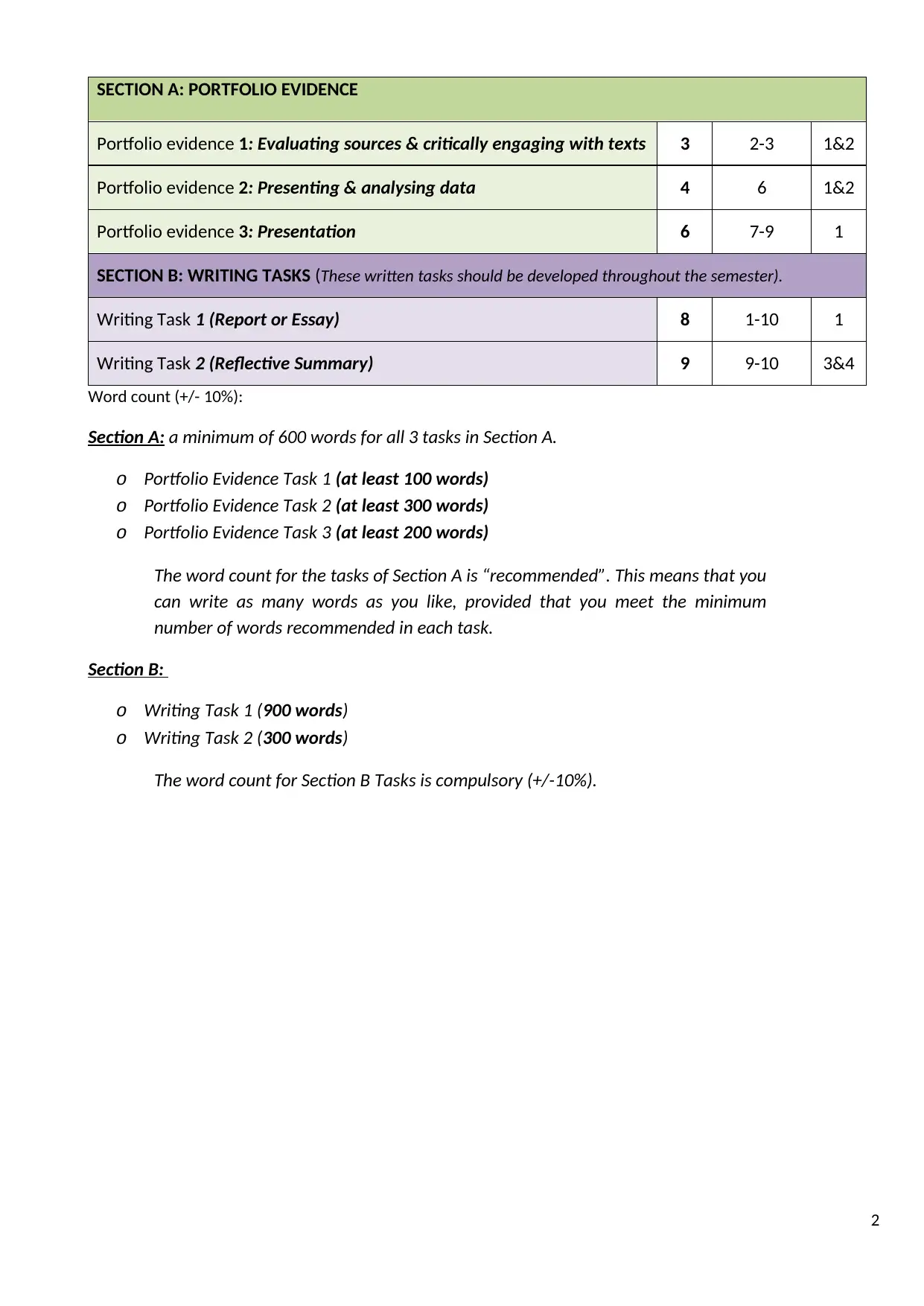
SECTION A: PORTFOLIO EVIDENCE
Portfolio evidence 1: Evaluating sources & critically engaging with texts 3 2-3 1&2
Portfolio evidence 2: Presenting & analysing data 4 6 1&2
Portfolio evidence 3: Presentation 6 7-9 1
SECTION B: WRITING TASKS (These written tasks should be developed throughout the semester).
Writing Task 1 (Report or Essay) 8 1-10 1
Writing Task 2 (Reflective Summary) 9 9-10 3&4
Word count (+/- 10%):
Section A: a minimum of 600 words for all 3 tasks in Section A.
o Portfolio Evidence Task 1 (at least 100 words)
o Portfolio Evidence Task 2 (at least 300 words)
o Portfolio Evidence Task 3 (at least 200 words)
The word count for the tasks of Section A is “recommended”. This means that you
can write as many words as you like, provided that you meet the minimum
number of words recommended in each task.
Section B:
o Writing Task 1 (900 words)
o Writing Task 2 (300 words)
The word count for Section B Tasks is compulsory (+/-10%).
2
Portfolio evidence 1: Evaluating sources & critically engaging with texts 3 2-3 1&2
Portfolio evidence 2: Presenting & analysing data 4 6 1&2
Portfolio evidence 3: Presentation 6 7-9 1
SECTION B: WRITING TASKS (These written tasks should be developed throughout the semester).
Writing Task 1 (Report or Essay) 8 1-10 1
Writing Task 2 (Reflective Summary) 9 9-10 3&4
Word count (+/- 10%):
Section A: a minimum of 600 words for all 3 tasks in Section A.
o Portfolio Evidence Task 1 (at least 100 words)
o Portfolio Evidence Task 2 (at least 300 words)
o Portfolio Evidence Task 3 (at least 200 words)
The word count for the tasks of Section A is “recommended”. This means that you
can write as many words as you like, provided that you meet the minimum
number of words recommended in each task.
Section B:
o Writing Task 1 (900 words)
o Writing Task 2 (300 words)
The word count for Section B Tasks is compulsory (+/-10%).
2
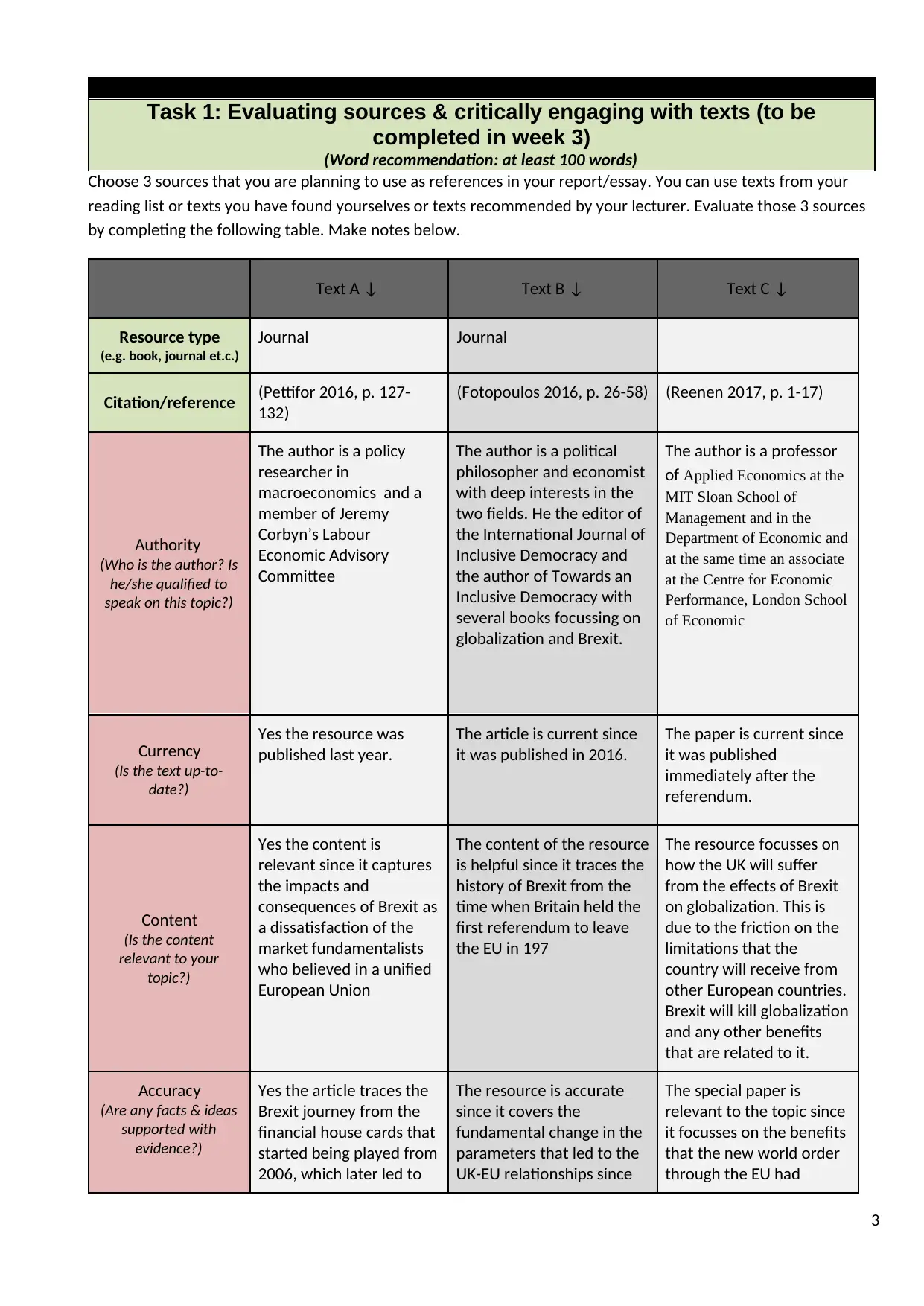
SECTION A: PORTFOLIO EVIDENCE
Task 1: Evaluating sources & critically engaging with texts (to be
completed in week 3)
(Word recommendation: at least 100 words)
Choose 3 sources that you are planning to use as references in your report/essay. You can use texts from your
reading list or texts you have found yourselves or texts recommended by your lecturer. Evaluate those 3 sources
by completing the following table. Make notes below.
Text A ↓ Text B ↓ Text C ↓
Resource type
(e.g. book, journal et.c.)
Journal Journal
Citation/reference (Pettifor 2016, p. 127-
132)
(Fotopoulos 2016, p. 26-58) (Reenen 2017, p. 1-17)
Authority
(Who is the author? Is
he/she qualified to
speak on this topic?)
The author is a policy
researcher in
macroeconomics and a
member of Jeremy
Corbyn’s Labour
Economic Advisory
Committee
The author is a political
philosopher and economist
with deep interests in the
two fields. He the editor of
the International Journal of
Inclusive Democracy and
the author of Towards an
Inclusive Democracy with
several books focussing on
globalization and Brexit.
The author is a professor
of Applied Economics at the
MIT Sloan School of
Management and in the
Department of Economic and
at the same time an associate
at the Centre for Economic
Performance, London School
of Economic
Currency
(Is the text up-to-
date?)
Yes the resource was
published last year.
The article is current since
it was published in 2016.
The paper is current since
it was published
immediately after the
referendum.
Content
(Is the content
relevant to your
topic?)
Yes the content is
relevant since it captures
the impacts and
consequences of Brexit as
a dissatisfaction of the
market fundamentalists
who believed in a unified
European Union
The content of the resource
is helpful since it traces the
history of Brexit from the
time when Britain held the
first referendum to leave
the EU in 197
The resource focusses on
how the UK will suffer
from the effects of Brexit
on globalization. This is
due to the friction on the
limitations that the
country will receive from
other European countries.
Brexit will kill globalization
and any other benefits
that are related to it.
Accuracy
(Are any facts & ideas
supported with
evidence?)
Yes the article traces the
Brexit journey from the
financial house cards that
started being played from
2006, which later led to
The resource is accurate
since it covers the
fundamental change in the
parameters that led to the
UK-EU relationships since
The special paper is
relevant to the topic since
it focusses on the benefits
that the new world order
through the EU had
3
Task 1: Evaluating sources & critically engaging with texts (to be
completed in week 3)
(Word recommendation: at least 100 words)
Choose 3 sources that you are planning to use as references in your report/essay. You can use texts from your
reading list or texts you have found yourselves or texts recommended by your lecturer. Evaluate those 3 sources
by completing the following table. Make notes below.
Text A ↓ Text B ↓ Text C ↓
Resource type
(e.g. book, journal et.c.)
Journal Journal
Citation/reference (Pettifor 2016, p. 127-
132)
(Fotopoulos 2016, p. 26-58) (Reenen 2017, p. 1-17)
Authority
(Who is the author? Is
he/she qualified to
speak on this topic?)
The author is a policy
researcher in
macroeconomics and a
member of Jeremy
Corbyn’s Labour
Economic Advisory
Committee
The author is a political
philosopher and economist
with deep interests in the
two fields. He the editor of
the International Journal of
Inclusive Democracy and
the author of Towards an
Inclusive Democracy with
several books focussing on
globalization and Brexit.
The author is a professor
of Applied Economics at the
MIT Sloan School of
Management and in the
Department of Economic and
at the same time an associate
at the Centre for Economic
Performance, London School
of Economic
Currency
(Is the text up-to-
date?)
Yes the resource was
published last year.
The article is current since
it was published in 2016.
The paper is current since
it was published
immediately after the
referendum.
Content
(Is the content
relevant to your
topic?)
Yes the content is
relevant since it captures
the impacts and
consequences of Brexit as
a dissatisfaction of the
market fundamentalists
who believed in a unified
European Union
The content of the resource
is helpful since it traces the
history of Brexit from the
time when Britain held the
first referendum to leave
the EU in 197
The resource focusses on
how the UK will suffer
from the effects of Brexit
on globalization. This is
due to the friction on the
limitations that the
country will receive from
other European countries.
Brexit will kill globalization
and any other benefits
that are related to it.
Accuracy
(Are any facts & ideas
supported with
evidence?)
Yes the article traces the
Brexit journey from the
financial house cards that
started being played from
2006, which later led to
The resource is accurate
since it covers the
fundamental change in the
parameters that led to the
UK-EU relationships since
The special paper is
relevant to the topic since
it focusses on the benefits
that the new world order
through the EU had
3
⊘ This is a preview!⊘
Do you want full access?
Subscribe today to unlock all pages.

Trusted by 1+ million students worldwide
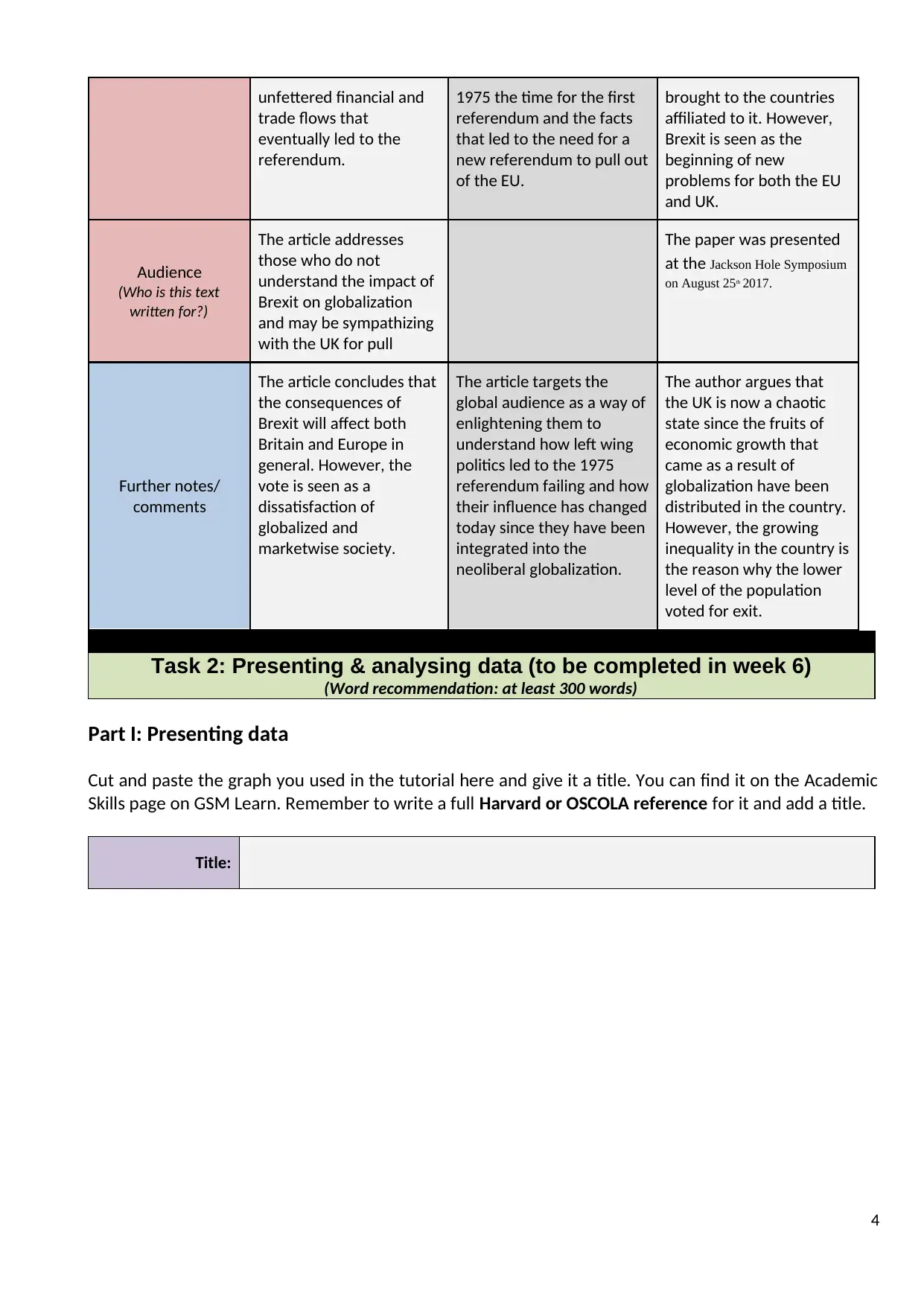
unfettered financial and
trade flows that
eventually led to the
referendum.
1975 the time for the first
referendum and the facts
that led to the need for a
new referendum to pull out
of the EU.
brought to the countries
affiliated to it. However,
Brexit is seen as the
beginning of new
problems for both the EU
and UK.
Audience
(Who is this text
written for?)
The article addresses
those who do not
understand the impact of
Brexit on globalization
and may be sympathizing
with the UK for pull
The paper was presented
at the Jackson Hole Symposium
on August 25th 2017.
Further notes/
comments
The article concludes that
the consequences of
Brexit will affect both
Britain and Europe in
general. However, the
vote is seen as a
dissatisfaction of
globalized and
marketwise society.
The article targets the
global audience as a way of
enlightening them to
understand how left wing
politics led to the 1975
referendum failing and how
their influence has changed
today since they have been
integrated into the
neoliberal globalization.
The author argues that
the UK is now a chaotic
state since the fruits of
economic growth that
came as a result of
globalization have been
distributed in the country.
However, the growing
inequality in the country is
the reason why the lower
level of the population
voted for exit.
SECTION A: PORTFOLIO EVIDENCE
Task 2: Presenting & analysing data (to be completed in week 6)
(Word recommendation: at least 300 words)
Part I: Presenting data
Cut and paste the graph you used in the tutorial here and give it a title. You can find it on the Academic
Skills page on GSM Learn. Remember to write a full Harvard or OSCOLA reference for it and add a title.
Title:
4
trade flows that
eventually led to the
referendum.
1975 the time for the first
referendum and the facts
that led to the need for a
new referendum to pull out
of the EU.
brought to the countries
affiliated to it. However,
Brexit is seen as the
beginning of new
problems for both the EU
and UK.
Audience
(Who is this text
written for?)
The article addresses
those who do not
understand the impact of
Brexit on globalization
and may be sympathizing
with the UK for pull
The paper was presented
at the Jackson Hole Symposium
on August 25th 2017.
Further notes/
comments
The article concludes that
the consequences of
Brexit will affect both
Britain and Europe in
general. However, the
vote is seen as a
dissatisfaction of
globalized and
marketwise society.
The article targets the
global audience as a way of
enlightening them to
understand how left wing
politics led to the 1975
referendum failing and how
their influence has changed
today since they have been
integrated into the
neoliberal globalization.
The author argues that
the UK is now a chaotic
state since the fruits of
economic growth that
came as a result of
globalization have been
distributed in the country.
However, the growing
inequality in the country is
the reason why the lower
level of the population
voted for exit.
SECTION A: PORTFOLIO EVIDENCE
Task 2: Presenting & analysing data (to be completed in week 6)
(Word recommendation: at least 300 words)
Part I: Presenting data
Cut and paste the graph you used in the tutorial here and give it a title. You can find it on the Academic
Skills page on GSM Learn. Remember to write a full Harvard or OSCOLA reference for it and add a title.
Title:
4
Paraphrase This Document
Need a fresh take? Get an instant paraphrase of this document with our AI Paraphraser

Graph:
Reference:
5
Reference:
5
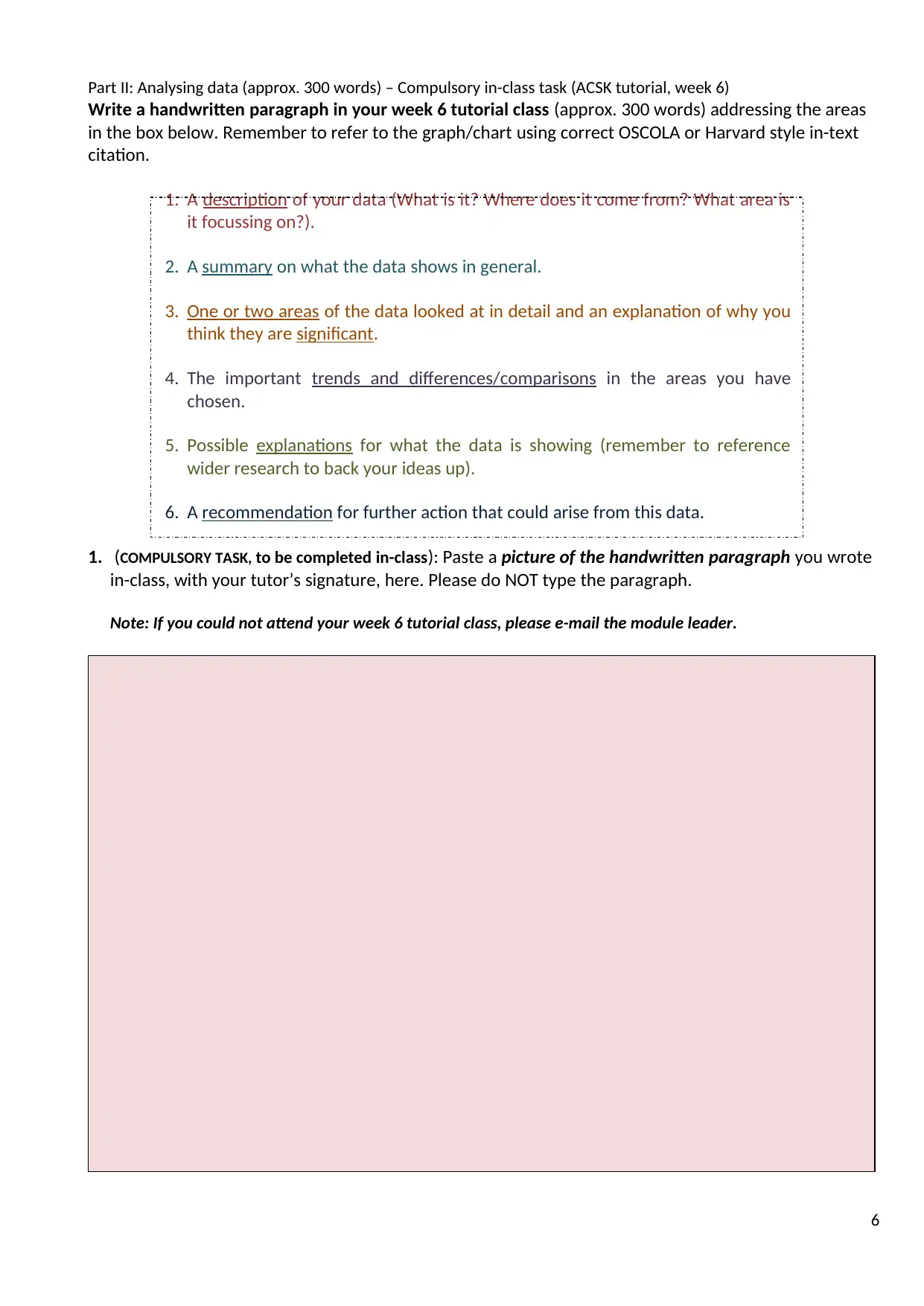
Part II: Analysing data (approx. 300 words) – Compulsory in-class task (ACSK tutorial, week 6)
Write a handwritten paragraph in your week 6 tutorial class (approx. 300 words) addressing the areas
in the box below. Remember to refer to the graph/chart using correct OSCOLA or Harvard style in-text
citation.
1. A description of your data (What is it? Where does it come from? What area is
it focussing on?).
2. A summary on what the data shows in general.
3. One or two areas of the data looked at in detail and an explanation of why you
think they are significant.
4. The important trends and differences/comparisons in the areas you have
chosen.
5. Possible explanations for what the data is showing (remember to reference
wider research to back your ideas up).
6. A recommendation for further action that could arise from this data.
1. (COMPULSORY TASK, to be completed in-class): Paste a picture of the handwritten paragraph you wrote
in-class, with your tutor’s signature, here. Please do NOT type the paragraph.
Note: If you could not attend your week 6 tutorial class, please e-mail the module leader.
6
Write a handwritten paragraph in your week 6 tutorial class (approx. 300 words) addressing the areas
in the box below. Remember to refer to the graph/chart using correct OSCOLA or Harvard style in-text
citation.
1. A description of your data (What is it? Where does it come from? What area is
it focussing on?).
2. A summary on what the data shows in general.
3. One or two areas of the data looked at in detail and an explanation of why you
think they are significant.
4. The important trends and differences/comparisons in the areas you have
chosen.
5. Possible explanations for what the data is showing (remember to reference
wider research to back your ideas up).
6. A recommendation for further action that could arise from this data.
1. (COMPULSORY TASK, to be completed in-class): Paste a picture of the handwritten paragraph you wrote
in-class, with your tutor’s signature, here. Please do NOT type the paragraph.
Note: If you could not attend your week 6 tutorial class, please e-mail the module leader.
6
⊘ This is a preview!⊘
Do you want full access?
Subscribe today to unlock all pages.

Trusted by 1+ million students worldwide
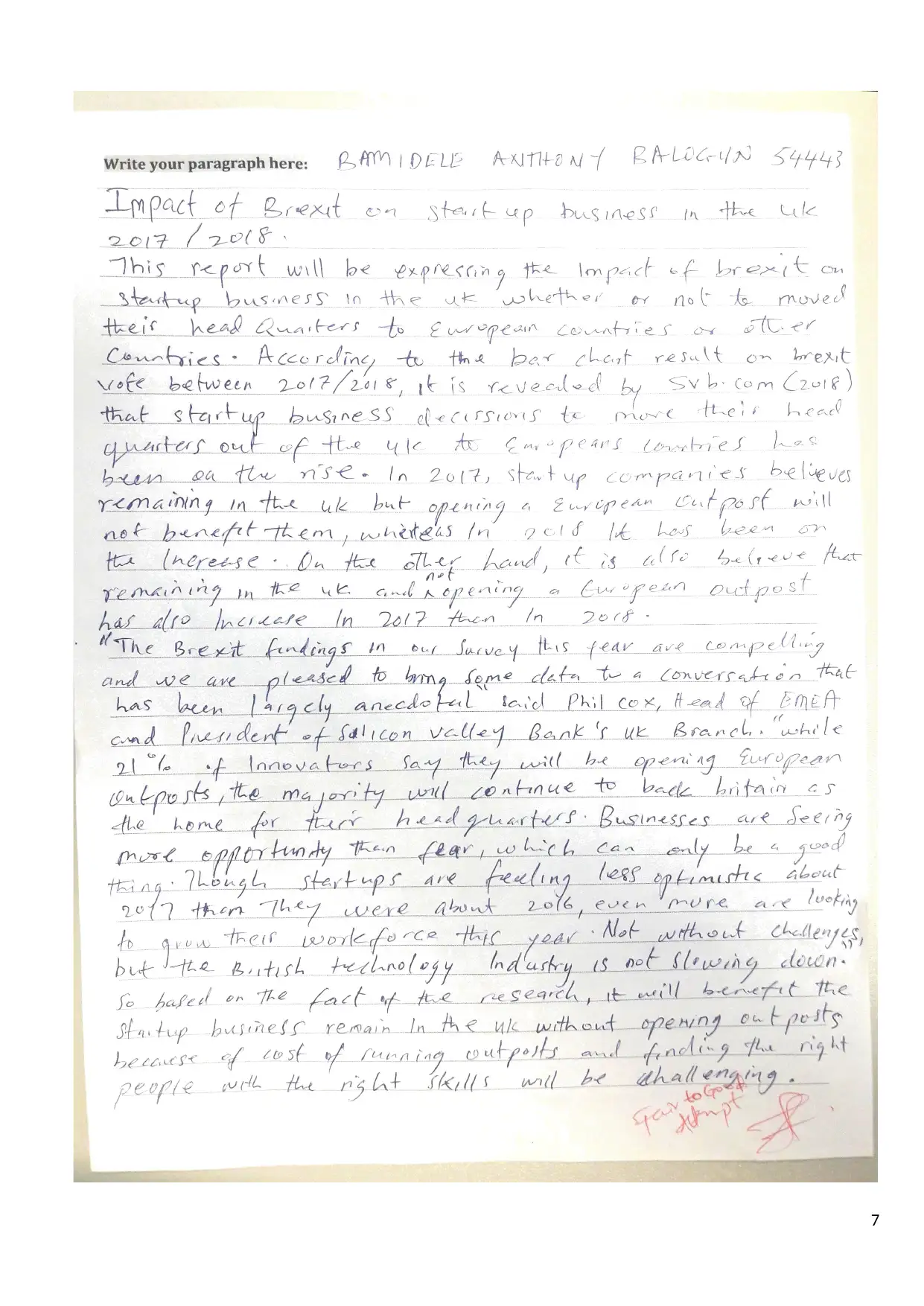
7
Paraphrase This Document
Need a fresh take? Get an instant paraphrase of this document with our AI Paraphraser

2. (OPTIONAL TASK, to be completed independently): Re-write the paragraph you wrote in-class, making
improvements. Type your improved paragraph below.
8
improvements. Type your improved paragraph below.
8
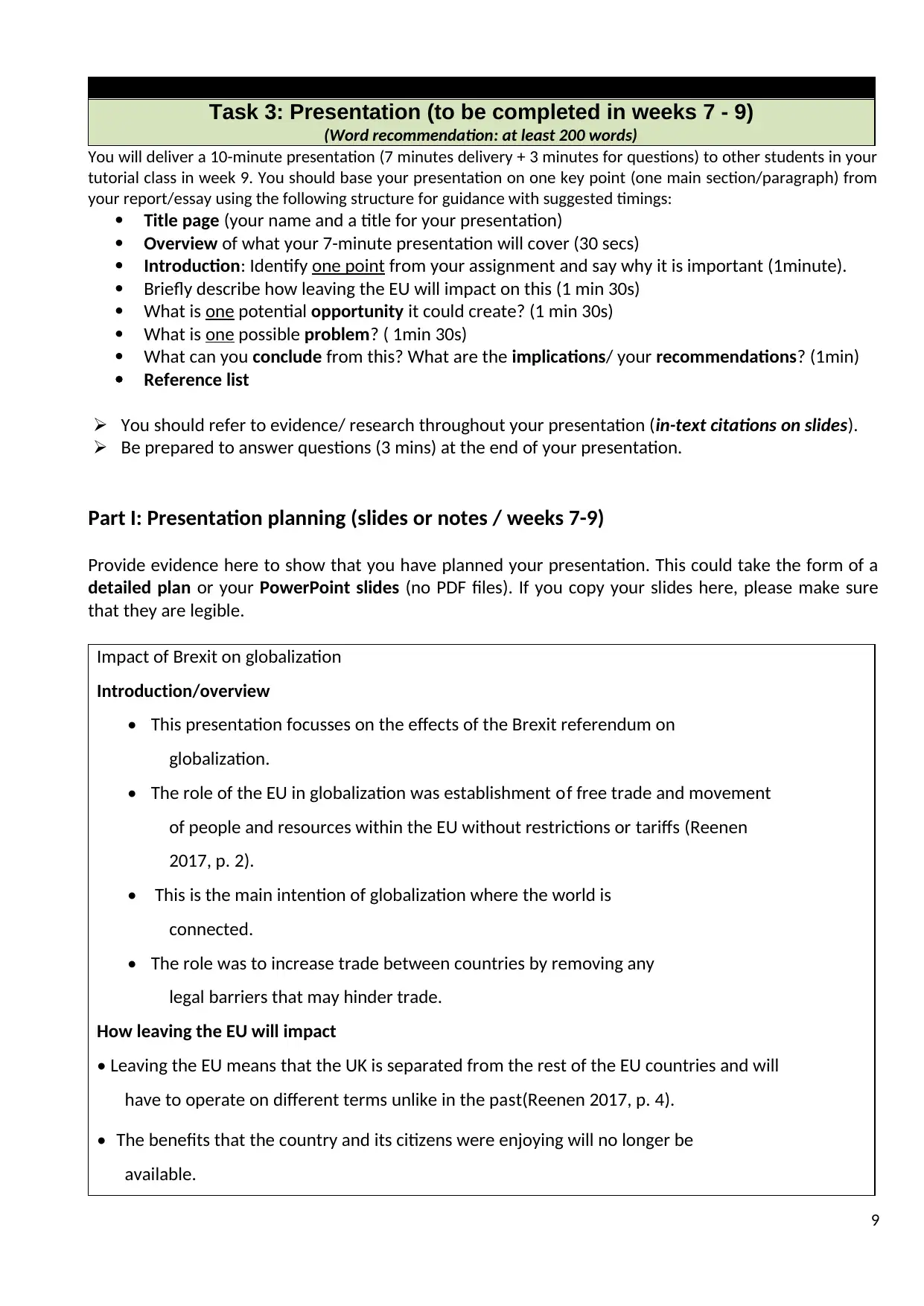
SECTION A: PORTFOLIO EVIDENCE
Task 3: Presentation (to be completed in weeks 7 - 9)
(Word recommendation: at least 200 words)
You will deliver a 10-minute presentation (7 minutes delivery + 3 minutes for questions) to other students in your
tutorial class in week 9. You should base your presentation on one key point (one main section/paragraph) from
your report/essay using the following structure for guidance with suggested timings:
Title page (your name and a title for your presentation)
Overview of what your 7-minute presentation will cover (30 secs)
Introduction: Identify one point from your assignment and say why it is important (1minute).
Briefly describe how leaving the EU will impact on this (1 min 30s)
What is one potential opportunity it could create? (1 min 30s)
What is one possible problem? ( 1min 30s)
What can you conclude from this? What are the implications/ your recommendations? (1min)
Reference list
You should refer to evidence/ research throughout your presentation (in-text citations on slides).
Be prepared to answer questions (3 mins) at the end of your presentation.
Part I: Presentation planning (slides or notes / weeks 7-9)
Provide evidence here to show that you have planned your presentation. This could take the form of a
detailed plan or your PowerPoint slides (no PDF files). If you copy your slides here, please make sure
that they are legible.
Impact of Brexit on globalization
I nt rodu c t ion /o v erv ie w
• This presentation focusses on the effects of the Brexit referendum on
globalization.
• The role of the EU in globalization was establishment of free trade and movement
of people and resources within the EU without restrictions or tariffs (Reenen
2017, p. 2).
• This is the main intention of globalization where the world is
connected.
• The role was to increase trade between countries by removing any
legal barriers that may hinder trade.
How leaving the EU will impact
• Leaving the EU means that the UK is separated from the rest of the EU countries and will
have to operate on different terms unlike in the past(Reenen 2017, p. 4).
• The benefits that the country and its citizens were enjoying will no longer be
available.
9
Task 3: Presentation (to be completed in weeks 7 - 9)
(Word recommendation: at least 200 words)
You will deliver a 10-minute presentation (7 minutes delivery + 3 minutes for questions) to other students in your
tutorial class in week 9. You should base your presentation on one key point (one main section/paragraph) from
your report/essay using the following structure for guidance with suggested timings:
Title page (your name and a title for your presentation)
Overview of what your 7-minute presentation will cover (30 secs)
Introduction: Identify one point from your assignment and say why it is important (1minute).
Briefly describe how leaving the EU will impact on this (1 min 30s)
What is one potential opportunity it could create? (1 min 30s)
What is one possible problem? ( 1min 30s)
What can you conclude from this? What are the implications/ your recommendations? (1min)
Reference list
You should refer to evidence/ research throughout your presentation (in-text citations on slides).
Be prepared to answer questions (3 mins) at the end of your presentation.
Part I: Presentation planning (slides or notes / weeks 7-9)
Provide evidence here to show that you have planned your presentation. This could take the form of a
detailed plan or your PowerPoint slides (no PDF files). If you copy your slides here, please make sure
that they are legible.
Impact of Brexit on globalization
I nt rodu c t ion /o v erv ie w
• This presentation focusses on the effects of the Brexit referendum on
globalization.
• The role of the EU in globalization was establishment of free trade and movement
of people and resources within the EU without restrictions or tariffs (Reenen
2017, p. 2).
• This is the main intention of globalization where the world is
connected.
• The role was to increase trade between countries by removing any
legal barriers that may hinder trade.
How leaving the EU will impact
• Leaving the EU means that the UK is separated from the rest of the EU countries and will
have to operate on different terms unlike in the past(Reenen 2017, p. 4).
• The benefits that the country and its citizens were enjoying will no longer be
available.
9
⊘ This is a preview!⊘
Do you want full access?
Subscribe today to unlock all pages.

Trusted by 1+ million students worldwide
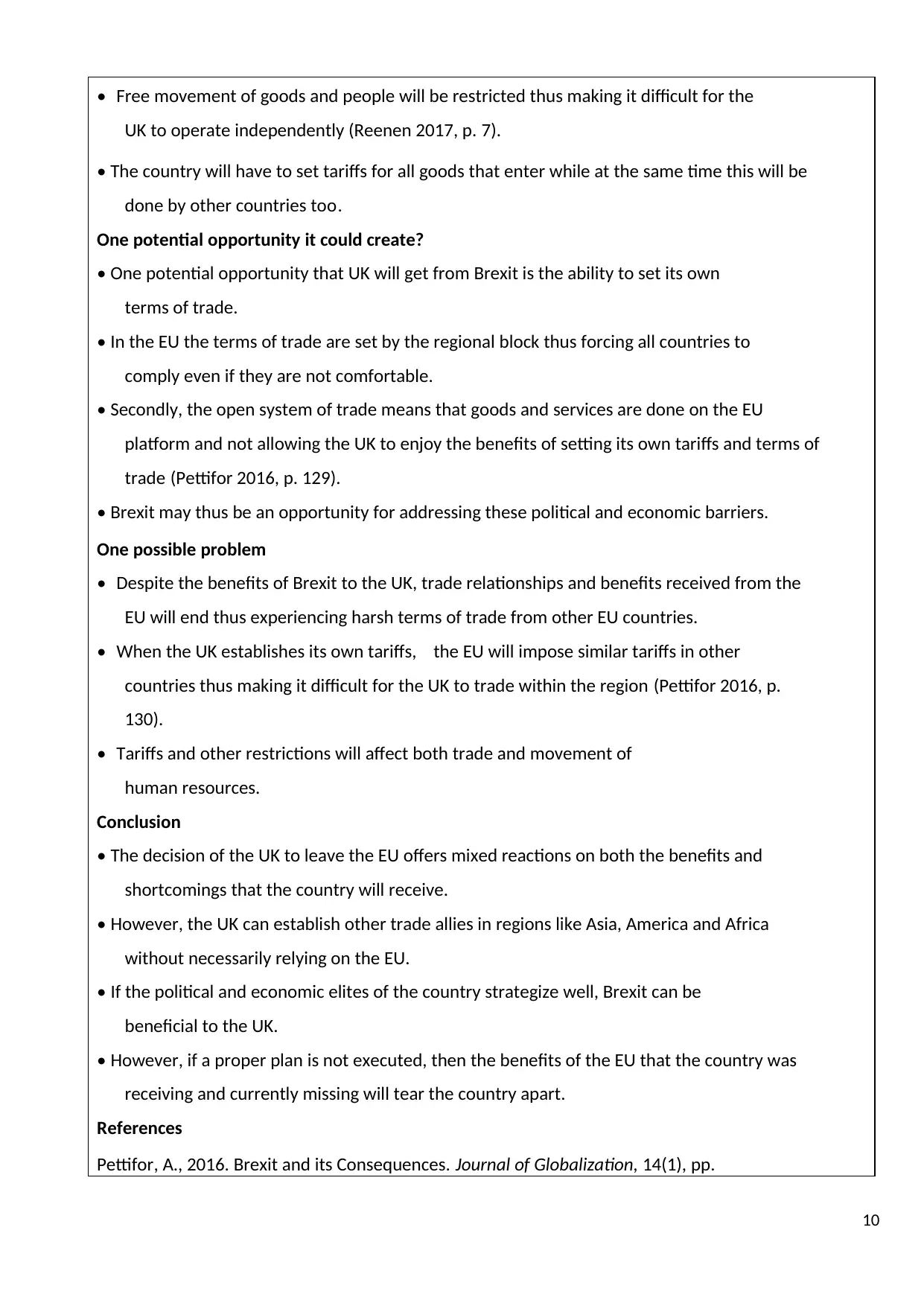
• Free movement of goods and people will be restricted thus making it difficult for the
UK to operate independently (Reenen 2017, p. 7).
• The country will have to set tariffs for all goods that enter while at the same time this will be
done by other countries too.
One potential opportunity it could create?
• One potential opportunity that UK will get from Brexit is the ability to set its own
terms of trade.
• In the EU the terms of trade are set by the regional block thus forcing all countries to
comply even if they are not comfortable.
• Secondly, the open system of trade means that goods and services are done on the EU
platform and not allowing the UK to enjoy the benefits of setting its own tariffs and terms of
trade (Pettifor 2016, p. 129).
• Brexit may thus be an opportunity for addressing these political and economic barriers.
One possible problem
• Despite the benefits of Brexit to the UK, trade relationships and benefits received from the
EU will end thus experiencing harsh terms of trade from other EU countries.
• When the UK establishes its own tariffs, the EU will impose similar tariffs in other
countries thus making it difficult for the UK to trade within the region (Pettifor 2016, p.
130).
• Tariffs and other restrictions will affect both trade and movement of
human resources.
Conclusion
• The decision of the UK to leave the EU offers mixed reactions on both the benefits and
shortcomings that the country will receive.
• However, the UK can establish other trade allies in regions like Asia, America and Africa
without necessarily relying on the EU.
• If the political and economic elites of the country strategize well, Brexit can be
beneficial to the UK.
• However, if a proper plan is not executed, then the benefits of the EU that the country was
receiving and currently missing will tear the country apart.
References
Pettifor, A., 2016. Brexit and its Consequences. Journal of Globalization, 14(1), pp.
10
UK to operate independently (Reenen 2017, p. 7).
• The country will have to set tariffs for all goods that enter while at the same time this will be
done by other countries too.
One potential opportunity it could create?
• One potential opportunity that UK will get from Brexit is the ability to set its own
terms of trade.
• In the EU the terms of trade are set by the regional block thus forcing all countries to
comply even if they are not comfortable.
• Secondly, the open system of trade means that goods and services are done on the EU
platform and not allowing the UK to enjoy the benefits of setting its own tariffs and terms of
trade (Pettifor 2016, p. 129).
• Brexit may thus be an opportunity for addressing these political and economic barriers.
One possible problem
• Despite the benefits of Brexit to the UK, trade relationships and benefits received from the
EU will end thus experiencing harsh terms of trade from other EU countries.
• When the UK establishes its own tariffs, the EU will impose similar tariffs in other
countries thus making it difficult for the UK to trade within the region (Pettifor 2016, p.
130).
• Tariffs and other restrictions will affect both trade and movement of
human resources.
Conclusion
• The decision of the UK to leave the EU offers mixed reactions on both the benefits and
shortcomings that the country will receive.
• However, the UK can establish other trade allies in regions like Asia, America and Africa
without necessarily relying on the EU.
• If the political and economic elites of the country strategize well, Brexit can be
beneficial to the UK.
• However, if a proper plan is not executed, then the benefits of the EU that the country was
receiving and currently missing will tear the country apart.
References
Pettifor, A., 2016. Brexit and its Consequences. Journal of Globalization, 14(1), pp.
10
Paraphrase This Document
Need a fresh take? Get an instant paraphrase of this document with our AI Paraphraser
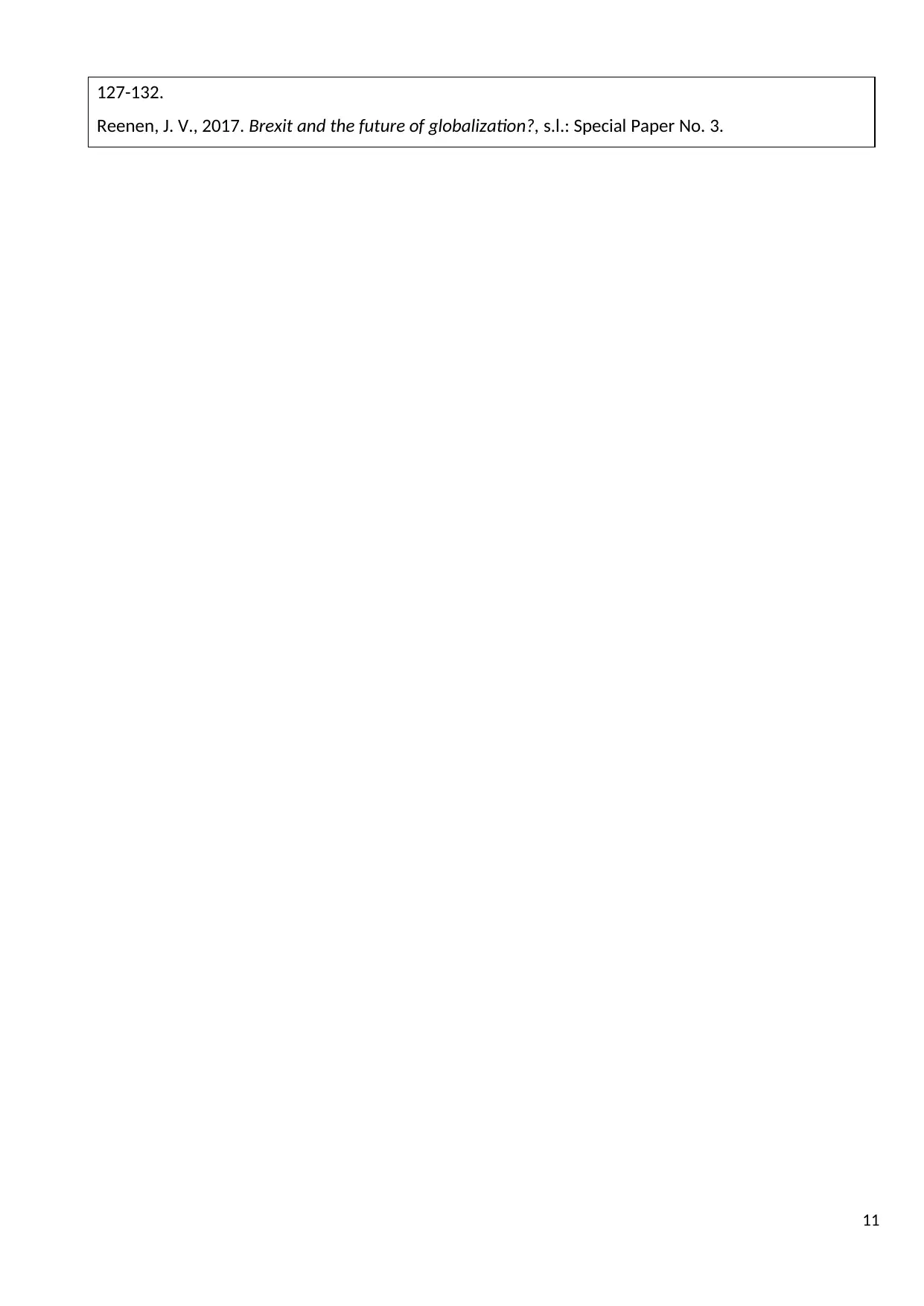
127-132.
Reenen, J. V., 2017. Brexit and the future of globalization?, s.l.: Special Paper No. 3.
11
Reenen, J. V., 2017. Brexit and the future of globalization?, s.l.: Special Paper No. 3.
11
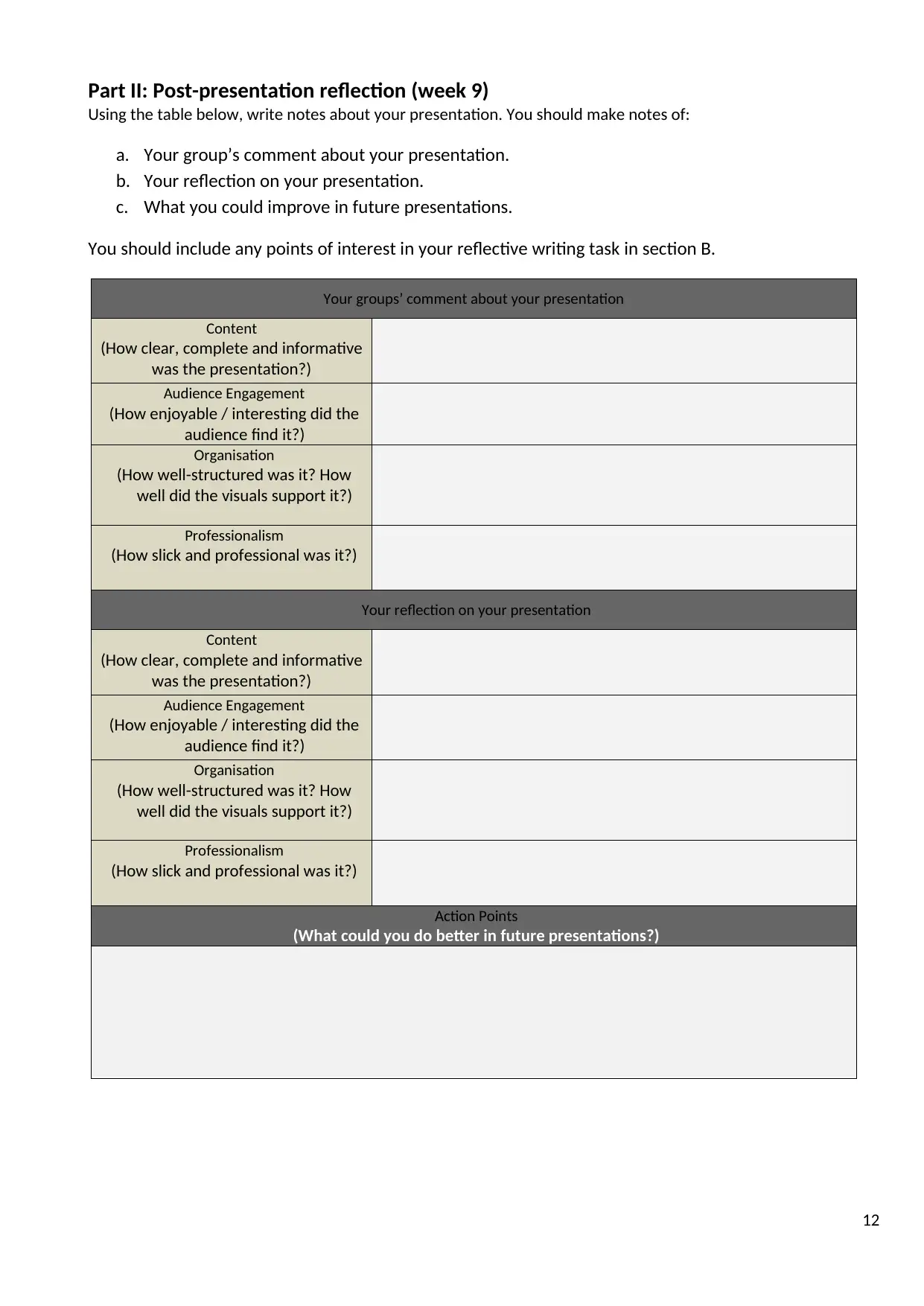
Part II: Post-presentation reflection (week 9)
Using the table below, write notes about your presentation. You should make notes of:
a. Your group’s comment about your presentation.
b. Your reflection on your presentation.
c. What you could improve in future presentations.
You should include any points of interest in your reflective writing task in section B.
Your groups’ comment about your presentation
Content
(How clear, complete and informative
was the presentation?)
Audience Engagement
(How enjoyable / interesting did the
audience find it?)
Organisation
(How well-structured was it? How
well did the visuals support it?)
Professionalism
(How slick and professional was it?)
Your reflection on your presentation
Content
(How clear, complete and informative
was the presentation?)
Audience Engagement
(How enjoyable / interesting did the
audience find it?)
Organisation
(How well-structured was it? How
well did the visuals support it?)
Professionalism
(How slick and professional was it?)
Action Points
(What could you do better in future presentations?)
12
Using the table below, write notes about your presentation. You should make notes of:
a. Your group’s comment about your presentation.
b. Your reflection on your presentation.
c. What you could improve in future presentations.
You should include any points of interest in your reflective writing task in section B.
Your groups’ comment about your presentation
Content
(How clear, complete and informative
was the presentation?)
Audience Engagement
(How enjoyable / interesting did the
audience find it?)
Organisation
(How well-structured was it? How
well did the visuals support it?)
Professionalism
(How slick and professional was it?)
Your reflection on your presentation
Content
(How clear, complete and informative
was the presentation?)
Audience Engagement
(How enjoyable / interesting did the
audience find it?)
Organisation
(How well-structured was it? How
well did the visuals support it?)
Professionalism
(How slick and professional was it?)
Action Points
(What could you do better in future presentations?)
12
⊘ This is a preview!⊘
Do you want full access?
Subscribe today to unlock all pages.

Trusted by 1+ million students worldwide
1 out of 17
Related Documents
Your All-in-One AI-Powered Toolkit for Academic Success.
+13062052269
info@desklib.com
Available 24*7 on WhatsApp / Email
![[object Object]](/_next/static/media/star-bottom.7253800d.svg)
Unlock your academic potential
Copyright © 2020–2026 A2Z Services. All Rights Reserved. Developed and managed by ZUCOL.



